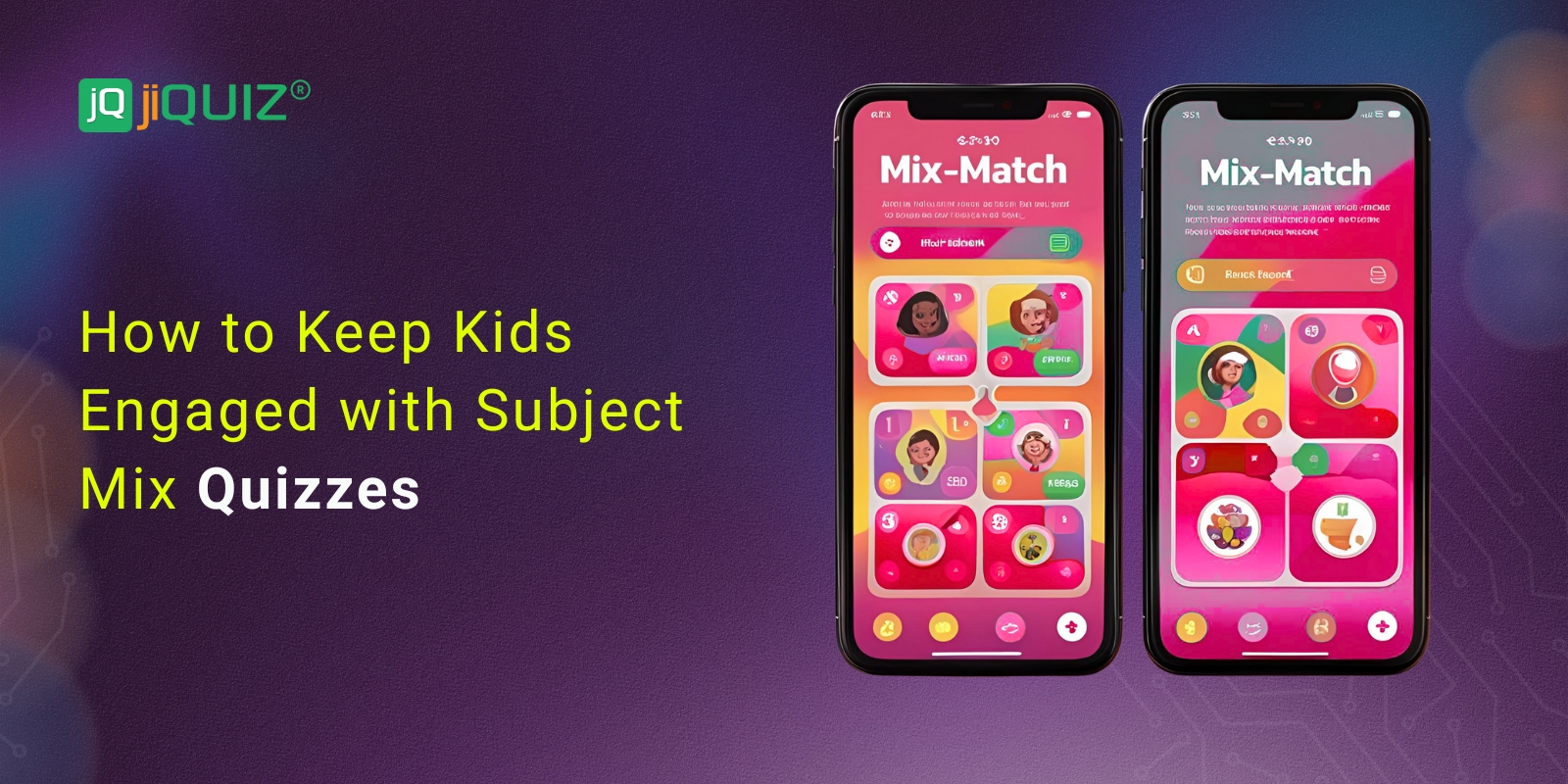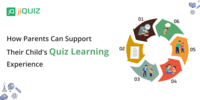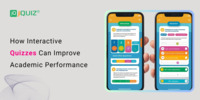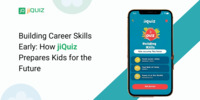- Jun 27, 2025
- Career & Skills
- 490
Share this post on:

Let's be honest: traditional quizzes can be a drag. Rows of multiple-choice questions, endless fill-in-the-blanks... it’s a recipe for disengagement, especially for kids who already find learning a challenge. But what if quizzes could be fun? What if they could spark curiosity and reinforce learning in unexpected ways? Enter the subject mix quiz: a dynamic and engaging learning tool that blends concepts from different subjects to create stimulating and memorable learning experiences.
This blog post will explore how subject mix quizzes can revolutionize the way kids learn, covering everything from the underlying principles to practical implementation, age-appropriate examples, and potential challenges to overcome.
What Is a Subject Mix Quiz?
A subject mix quiz isn’t your typical assessment. It deliberately incorporates questions or scenarios that draw upon multiple disciplines. Instead of a quiz solely about fractions in math, you might present a word problem involving fractions and historical context (e.g., "If a baker used 2/3 of his flour to bake bread for a medieval feast, how much flour did he have left?"). The possibilities are endless! It’s about forging connections between seemingly disparate fields and demonstrating how knowledge is interconnected.
Why Subject Mix Quizzes Work: The Neuroscience of Engagement
The effectiveness of subject mix quizzes lies in several neurological principles:
- Novelty & Surprise: Our brains are wired to pay attention to the unexpected. A standard quiz quickly becomes predictable. Subject mix quizzes introduce novelty, grabbing attention and boosting engagement.
- Interdisciplinary Connections: Learning isn't compartmentalized. Subject mix quizzes reflect this reality, allowing students to see how concepts relate and reinforcing a holistic understanding. This makes information more meaningful and easier to remember.
- Problem-Solving & Critical Thinking: These quizzes often require students to apply knowledge from various areas, demanding higher-level thinking skills. This goes beyond rote memorization and encourages genuine understanding.
- Intrinsic Motivation: When learning feels like a game or a challenge, it becomes intrinsically motivating. The joy of solving a complex problem, connecting ideas, and demonstrating understanding becomes its own reward.
- Reduced Anxiety: For some students, traditional testing environments can trigger anxiety. A quiz framed as a challenge or a puzzle can be less intimidating and foster a more positive learning experience.
Age-Appropriate Examples: From Elementary to High School
The complexity and format of subject mix quizzes should be tailored to the student’s age and developmental stage.
- Elementary School (Ages 5-10): Focus: Connection & Fun
- Format: Picture-based quizzes, drag-and-drop activities, short answer with visual prompts.
- Example: "Match the animal (science) to its habitat (social studies) and then calculate how much food it might need each week (math). Draw a picture to show your answer!" (Combines science, social studies, math, and art).
- Theme-Based: A quiz about pirates could involve measuring distances (math), researching historical pirate routes (social studies), identifying different types of ships (science), and writing a short pirate poem (language arts).
- Middle School (Ages 11-14): Focus: Application & Analysis
- Format: Short answer, multiple choice with reasoning required, scenario-based questions.
- Example: “A city is planning a new park. Using your knowledge of geography, explain the best location for the park considering factors like sunlight, water access, and proximity to residential areas. Then, calculate the area of the park using geometric shapes. Finally, write a persuasive paragraph explaining why this location is beneficial to the community.” (Combines geography, math, writing, and civic engagement).
- Historical Simulations: “You are a historian analyzing primary source documents from the Civil War. Using your knowledge of history, economics, and persuasive writing, analyze the motivations behind the Emancipation Proclamation and write a short news article about its impact.”
- High School (Ages 15-18): Focus: Synthesis & Critical Evaluation
- Format: Essay questions, debate prompts, design challenges, research projects with integrated assessment.
- Example: “Design a sustainable farm that incorporates principles of biology, engineering, and economics. Present your design, justifying your choices and considering the environmental, social, and financial implications.” (Combines science, engineering, economics, and design).
- Ethical Dilemmas: "Analyze the ethical considerations surrounding genetic engineering, drawing on principles from biology, philosophy, and social responsibility. Develop a position paper outlining your perspective and supporting it with evidence.”
Practical Tips for Creating Engaging Subject Mix Quizzes:
- Start Small: Don’t overwhelm students with overly complex questions. Begin with simpler connections and gradually increase the difficulty.
- Choose Relevant Themes: Select themes that are genuinely engaging and connect to students' interests.
- Incorporate Storytelling: Wrap the quiz within a compelling narrative to enhance engagement and make the questions more memorable.
- Use Visuals: Images, videos, and interactive elements can significantly boost engagement and cater to different learning styles.
- Offer Choices: Allow students to choose between different types of questions or even different themes.
- Provide Feedback: Give specific and constructive feedback, highlighting both strengths and areas for improvement.
- Make it a Challenge, Not a Test: Frame the activity as a fun challenge, emphasizing the learning process rather than just the score.
- Leverage Technology: Interactive quiz platforms (Kahoot!, Quizizz, Google Forms) can make the experience more dynamic and engaging.
- Collaborative Quizzes: Have students work in teams to solve the mix subject questions, fostering collaboration and peer learning.
Potential Pitfalls and How to Avoid Them:
- Overcomplexity: Don't try to cram too many subjects into a single quiz. This can lead to confusion and frustration.
- Lack of Relevance: If the connections between subjects are contrived or irrelevant, students will disengage.
- Uneven Difficulty: Ensure that the questions from each subject are appropriately challenging.
- Assessment Challenges: Grading subject mix quizzes can be more complex than traditional assessments. Develop clear rubrics that account for the interdisciplinary nature of the questions.
- Teacher Preparation: Creating effective subject mix quizzes requires more time and effort on the part of the teacher. Provide teachers with adequate training and resources.
- Focusing Too Much on ‘Fun’: While engagement is key, don’t sacrifice learning rigor. Ensure that the quiz still assesses core concepts and skills.
The Future of Assessment: Embracing Interdisciplinary Learning
Subject mix quizzes represent a shift towards a more holistic and engaging approach to assessment. They move beyond rote memorization and encourage students to make meaningful connections between different areas of knowledge. As educators, it’s our responsibility to embrace these innovative assessment tools and create learning experiences that are both challenging and enjoyable. By fostering curiosity, promoting critical thinking, and celebrating interdisciplinary learning, we can empower students to become lifelong learners and problem solvers.









